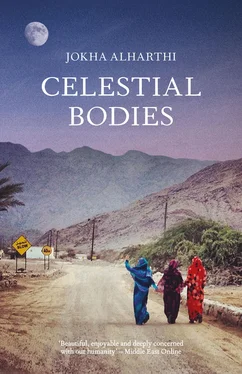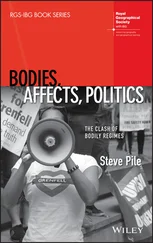Zarifa’s mother! People had nicknamed her Khayzuran, for like a reed of bamboo she was tall and gracefully slender. Her real name was Ankabuta: Spider-Girl. Her father had been fed up with his wife’s constant pregnancies and the terrible problem of finding yet another name. And the name of a baby born into a slave family must never, ever echo the names of the masters. When the time came, Spider-Girl was the only name he had in mind, and so it was.
Before she was even fifteen Ankabuta had become an ominously telling lesson for every slave woman — and every freewoman too, for that matter — who might have given even a passing thought to refusing her husband’s needs. Shaykh Said imprisoned her in an ancient cell in the fortress when she refused to sleep with his slave Nasib, to whom the Shaykh had married her off. Ankabuta languished in that cell for months. Once a day her food arrived and once a night her husband arrived. People had grown very tired of hearing her scream and finally she was freed. Maybe it was because Nasib had been declaring how sick he was of always having to tie her limbs to the rusting iron bedposts and stuffing her mouth with his turban-cloth, just to get his husbandly rights.
Ankabuta came out of prison pregnant with her only daughter. She was alone when the baby came, and after tying the cord Ankabuta decided to become a midwife, competing with Sabeekah who specialised in birthing for the daughters of shaykhs. People in al-Awafi hadn’t realised that Ankabuta’s hard dark face concealed an awesome and voracious appetite for living, though some did have an inkling that this woman who inclined to silence and self-concealment was in fact the great Mama who presided over the zar exorcisms, once a month in the desert out beyond the fortress and the farms that marked al-Awafi’s outer edges.
Thank you, my bright-faced air hostess. The orange cake is truly delicious even if I would have preferred our Omani jellies over any of the things you call halveh or — as London would say in emphatic English, sweeeeets. In the festival seasons or when my father’s large house was filled with guests, I would always wrap up a big portion of beautifully greasy dark hilwa in a page torn from my school notebook and carry it to Ustaz Mamduh. There were many times when I didn’t even get to taste these special sweets myself. In sociable gatherings the older and grander men always ate first. It was inappropriate for a young one like myself to show any appetite or to compete with the elders, and often the sweets on their tray were whisked away too rapidly for little hands like mine to have a chance. Whenever it came to that, my hopes would completely vanish, for I knew that my aunt would take charge and lock it all away in the storeroom, and I wouldn’t have the courage to ask for any.
But then Zarifa remembers about Ustaz Mamduh and, before anyone can notice, spirits away a big chunk for his sake. Or for the sake of the diploma. Just seeing the green cover of my diploma told her it was something to celebrate even though she didn’t understand a single word of what was written inside.
Once in a while I am enormously lucky, securing two massive chunks of it. One I wrap up for Ustaz Mamduh and the other I split with Maneen who has already caught a whiff of its light saffron smell even though I always try my hardest to keep the very scent of it under wraps. Maneen is always perched on a large rock in front of the opening to his mud house, which sits squarely on the route I have to take to school. Not a creature can pass in front of him without hearing that voice. Maneen is in bad shape, he moans. Give Maneen a few grains of rice, just a little handful! Pass him a bite of something sweet! I move from one school grade to the next but Maneen never changes his spot, as if he and the rock on which he sits were created as one piece, never to change, just as the worn-out robe he wears never changes. The only thing that changes is that he discovers mulberry cordial. He adds a line to his singsong call: Give him some Vimto to wet his throat!
Maneen’s son Zayid is in my class at school but I never see Zayid with his father. He is always at school or playing with the lads in the neighbourhood. People say his mother ran off with another man when Zayid was still a nursing baby and so all the women in the neighbourhood pitched in, treating him with fondness and taking care of his needs until he was old enough to care for himself. Zayid never laughed, and when we raced he always got the better of all the other boys. Our races started where the canal begins and ended at the furthest edge of al-Awafi’s farms, and Zayid was always ahead.
Whenever Maneen catches sight of me he ratchets up the musicality of his familiar call. He claps his hands together as he asks me. Soooo, Abdallah? How’s your father? What little trifle have you brought poor Maneen today?
If my pockets are empty I respond by snapping at him. Maneen, I know very well that the Ministry of Welfare gives you thirty riyals! Then I take myself off, heading at a fast clip towards the school building. But if I’ve been lucky with my share of sweets I sit down with him on his rock and we eat the luscious jelly-like chunk together. His mouth crammed with jelly-sweets, chuckles, and saliva, Maneen repeats the same old story I have heard a thousand times. Heyyy, Abbuuud... a blessed boy just like your papa! Hooo, Abbuud, my man, in the year of the horrible rains. Kharsa! It was a disaster for sure. The water came down hard for ten whole days, this house of mine went melting into the ground and even the homes of the big folk leaked water until their roofs fell in. We were dying of hunger, my boy, the rain completely destroyed all the dates. Ruined. All of our mats and furnishings and clothing were wet through and no one could find anything to eat — nothing to buy, nothing to sell — Heyyyy, Abbuud, you came along in easy times, times of plenty. You’ve never seen real hunger. The year of the kharsa al-Awafi was afloat, it was just one big mess of gullies. Shaykh Said closed himself up in that fortress of his and he said to everyone, I have nothing left. All my dates have been ruined by the water, he said, and the fighting between the tribes took everything I owned.
But your father, he was a different story, bless the man! He opened his home, he put up tents for people in his own courtyard. They ate and drank until every cupboard door in the kitchen and storeroom was flung wide open and people could see with their own eyes that there was nothing more there. If it hadn’t been for your father and Shaykh Masuud — God’s mercy on the late Shaykh Masuud, my boy — we would have died of starvation. The year of the disaster, Abbuud — aye, and today all is fine with us, just see! The world, my son, what a world! So, Abbud — now, you don’t have any Vimto for poor Maneen?
We were growing up. Zayid no longer yanked at the girls’ braids without warning when we were playing hide-and-seek, dividing ourselves into two groups, boys against girls. Sanjar no longer reacted by diving for Zayid, throwing him to the ground and nearly throttling him. We grew up and Zayid went into the army. In a few years Maneen’s crumbling mudbrick house disappeared from the roadside to be replaced by a reinforced concrete home, three bedrooms and a sitting room. People said that Zayid had moved up rapidly through the ranks and was much approved of by the senior staff. He came back to al-Awafi infrequently now, in his red Camry. He rebuilt the house and filled it with large sacks of rice and sugar, and sealed tins of the best local sweets, the ones from Barka. When he did show up, he was always in uniform and everyone knew he was bringing crates of fruit and bottles of Vimto. Often he had a gang of workers in tow, to build another addition or to replace the wood door with a fancier one. But Maneen, his eyesight faded and his hair gone completely white, did not abandon the small rock on which he was always perched, or his tattered clothes, or his same old cry whenever someone passed by. The neighbours could hear furious rows erupting, as ever, between the father and his army-officer son. They could hear Maneen protesting that he couldn’t see any longer, and he was used to sitting by the roadside, he liked being there, it was his life, the people who came by. He didn’t want to be shut up inside a house even if it was brand new! He said he was only teasing people by calling out to them. All he wanted was some amusement, the pleasure a conversation gave him. No one actually gave him anything now, as they had in the days of poverty. No one was there to wash his clothes, he said, no one to cook the rice stacked up in the house. He liked eating with the neighbours anyway, he said, he liked being in the warm damp throng of children and their games. The neighbours could not make out any of the words his son was yelling back.
Читать дальше












